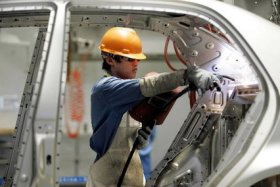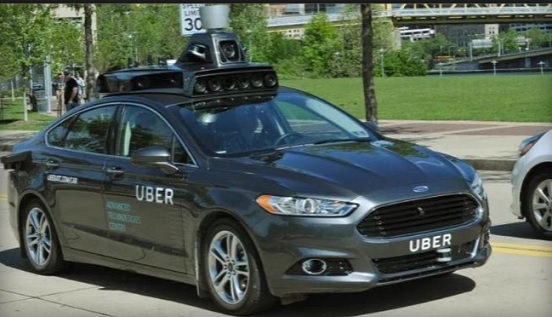 Clean vehicle job creation: Manufacturing clean vehicles directly supports 288,000 jobs in the U.S. economy, according to a new study released by Natural Resources Defense Council and the Blue Green Alliance. These are manufacturing and engineering jobs at more than 1,200 factories and engineering facilities in 48 states who produce technologies designed to improve vehicle fuel efficiency. Nine of these stats have 10,000 or more workers employed in these jobs, with the five of them – Michigan, Indiana, Ohio, Tennessee, and Kentucky – have plants building cleaner vehicle technologies supporting nearly 160,000 manufacturing jobs.
Clean vehicle job creation: Manufacturing clean vehicles directly supports 288,000 jobs in the U.S. economy, according to a new study released by Natural Resources Defense Council and the Blue Green Alliance. These are manufacturing and engineering jobs at more than 1,200 factories and engineering facilities in 48 states who produce technologies designed to improve vehicle fuel efficiency. Nine of these stats have 10,000 or more workers employed in these jobs, with the five of them – Michigan, Indiana, Ohio, Tennessee, and Kentucky – have plants building cleaner vehicle technologies supporting nearly 160,000 manufacturing jobs.
Tesla going to India?: Earlier this year, news came out about Tesla getting ready to enter the India market. Going to China has produced very strong sales results for the carmaker, and India has been seeing a growing auto sales market overall. Last week, CEO Elon Musk tweeted that Tesla would not be going to India due to the government’s requirement that 30% of the parts in Tesla cars would have to be sourced within that country. Tesla tends to do things its own way, so it may be holding off on entering the country until that can be worked out; or not entering at all. The electric carmaker recently denied that it will be forging a joint venture with the Chinese government after Musk met with a high-ranking government official. Tesla has wanted to build its own factory in China, and that may not happen if the government requires a joint venture with one of its government-owned companies. Both governments would like to see more electric cars sold locally to hit targets on vehicle emissions.
Rebates from utilities: Southern California Edison announced yesterday that it’s offering a $450 rebate to customers who own an all-electric or plug-in electric hybrid vehicle. The utility has been receiving state funds coming from California’s Low Carbon Fuel Standard program. Several electric utilities around the country are offering special rate programs for vehicle owners, including time-of-use (TOU) rates, to reduce the cost of powering an electric car or plug-in hybrid. In January, Pacific Gas and Electric Company (PG&E) launched the Clean Fuel Rebate for residential, electric customers who are electric vehicle drivers. It’s one-time $500 rebate for eligible EV owners can receive one rebate per owned or leased EV.
Mobility & Innovation: INRIX study says consumers trust tech giants more than Uber for autonomous vehicles
 INRIX, a leading provider of traffic information, has released a survey report on what U.S. and European drivers think about the future of autonomous vehicles – and who should be doing it. The survey interviewed 5,054 drivers in the U.S., France, Germany, Italy, and U.K., to find that major automakers and tech giants should lead the way over ridesharing firms or Tesla.
INRIX, a leading provider of traffic information, has released a survey report on what U.S. and European drivers think about the future of autonomous vehicles – and who should be doing it. The survey interviewed 5,054 drivers in the U.S., France, Germany, Italy, and U.K., to find that major automakers and tech giants should lead the way over ridesharing firms or Tesla.
“A new battleground is emerging between automakers, tech companies and ridesharing companies in the race to develop connected and autonomous vehicles,” explained Bob Pishue, senior economist at INRIX. “With hundreds of millions of connected cars expected to be on the roads within the next 15 years, the market share will be owned by companies that can educate drivers and gain consumer trust.”
The U.S. respondents preferred companies like Google and Apple providing self-driving cars., with 1.4 of them preferring tech giants over automakers. For those surveyed in the four European countries 1.5 times prefer major automakers (not including Tesla) over tech giants.
Ridesharing leaders Uber and Lyft had the smallest level of support as makers of autonomous vehicles. Following in a close second in the study is the category of newer carmakers that the study identifies as Tesla and “Fisker Motors.” That could mean the former Fisker Automotive, which is now split off into two companies – Henrik Fisker’s Fisker, Inc. startup and Wanxiang Group’s Karma Automotive.
For current connected car features and upcoming autonomous vehicles, many taking the survey believe that these technologies are bringing in a new era of vehicle safety. In the U.S., blind spot warning is the most desired new car feature; that’s followed by stolen vehicle warning/tracking, night vision, road incident alerts and re-routing, and rear/front collision alerts.
Millennials have less concern over their privacy through over their vehicle data than do Baby Boomers. That generation is also less convinced about how trustworthy autonomous vehicles with ll be, with 73 percent of Baby Boomers reporting in the study that they don’t believe autonomous vehicles will be safer than cars on the road today.



